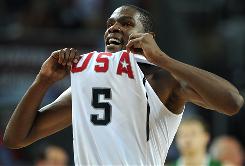1/2 Man, 1/2 Amazing
This may be a surprise to some, but I do appreciate (sort of) that not everyone that reads this blog is as fully invested and familiar with the nuances of sports, and in particular professional basketball.  1/2 Man
1/2 Man
So you may not have realized that the title of this post, 1/2 Man, 1/2 Amazing was not just meant as a general descriptive phrase, but rather was/is the nickname of an actual person, legendary street and playground legend Anthony Heyward. The nickname stems from a famous Heyward slam dunk over a much taller player. The full details of Heyward's nickname from Hoopedia:
An original member of the AND 1 team he earned Street Name, 1/2 Man balling at Rucker Park. After driving the lane and dunking on a dude that was much bigger then him, Rucker MC Duke Tango called him 1/2 Man 1/2 Amazing. The name has stuck ever since and we all know who was the first player to have it was (sorry Vince Carter).
Like many of the other streetball legends that have come before and since, 1/2 Man never has 'made it', that is, obtained the highest level of accomplishment in professional basketball, a contract with an NBA team. There are various theories why fantastic street ball talents like 1/2 Man have largely failed to make an impact in the Association, from lack of experience in structured offensive and defensive systems, to games that are kind of one-dimensional and thus easily defensed at the NBA level, or to a perception that the street or playground game is simply inferior to the NBA game, and consequently its stars, while talented, are by and large a level (or two) below top professional caliber.
I suppose it is debatable whether or not any individual playground star like 1/2 Man was or is talented enough to make it in the NBA, logically you would have to assume that if indeed an NBA contract were offered guys like 1/2 Man would jump at the chance, since even the minimum NBA salary (between about $500K and $1.4M based on experience) is bound to be far greater than what can be earned in the playgrounds and on barnstorming tours playing in local gyms.
But more interesting to me in the case of the NBA largely ignoring the playground legends, is considering how much of the snub is due to pure basketball ability and potential, and how much is based on these players not having the 'correct' background and more typical developmental experiences of NBA players. Even today, most new NBA players compete in American colleges, even if for only a year or two. Non North American players usually have experience in high-level professional leagues in Europe. With only the occasional exception (e.g. Rafer Alston, AKA 'Skip to my Lou' ), no one steps from the playground to the NBA.
Ok, so you are not in the business of stocking and NBA team. Sadly, neither am I. But chances are you and your organization is looking for help right now. Chances are even in a recession, your company has to fill and back fill jobs.
Chances you are looking to the same sources (Top 20 colleges, LinkedIn, or employee referrals) that have always worked for you in the past.
Chances are you don't have a scout watching the talent on the playground. And that is too bad.
Because that is where 1/2 Man 1/2 Amazing plays.
Email and feed subscribers click through

 Steve
Steve



